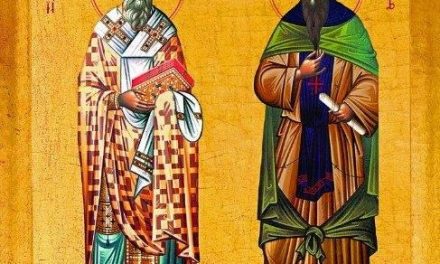While reading Pope Francis’s new apostolic exhortation Gaudete et Exsultate, on the call to holiness in today’s world, I was reminded of a contrast drawn by the influential moral theologian Germain Grisez in the first volume of his magnum opus The Way of the Lord Jesus. Grisez outlines two views of moral goodness that have deeply influenced the Catholic tradition.
First, Grisez describes what he calls the “scholastic natural-law theory,” which explains moral goodness in terms of conformity to the pattern of human nature. In this view, as Grisez explains, “actions are seen either to conform or not conform to the requirements set by nature,” and therefore are either good or evil (p. 104).
Although agreeing that morality must in some sense be grounded in human nature, Grisez objects that “human existence is more than conforming to a built-in pattern, as monkeys do when they eat bananas and otherwise do what comes naturally.” Rather, it is the very nature of human persons to “have possibilities which are not yet defined”; they “unfold themselves through intelligent creativity and freedom” (p. 105).
A Christian spirituality based on scholastic natural-law theory tends to focus on obedience to a set of minimal absolute prohibitions as the means of gaining Heaven and avoiding Hell, while leaving underdeveloped the path of Christian discipleship and ongoing perfection, according to Grisez (pp. 105-6). He himself proposes that Christian spirituality must also think of personal moral development in terms of the commitments one makes over a lifetime, through which one both limits one’s future choices and expands the possibilities for human fulfillment and creativity (pp. 236-38). These commitments are what give each of our lives a unique course, and through them we each develop our unique character.
Grisez is not arguing that we should abandon the notion that morality is grounded in our shared human nature in favor of a morality centered on self-creativity. In fact, he rejects what he considers a Nietzschean morality that considers self-creation the only moral value (p. 126). He insists that there are basic goods that fulfill each of us because we are human, yet we strive to fulfill these basic goods in ways consistent with the personal vocation we pursue through our unique commitments, rather than through conformity to a static pattern of human nature. Indeed, he insists that these basic goods fulfill us precisely because they allow us to realize greater potentialities (p. 117).
Put another way, the Aristotelian-Thomist strand of the Catholic moral tradition has rightly emphasized the normativity of our shared human nature, but it has erred in treating as “accidents” those things that distinguish us as unique persons. What we might call the existential (or Augustinian?) strand in the tradition has responded by insisting that our personal uniqueness is itself a distinguishing mark of what it means to be human, in a way that is not true for other created beings.
We can see this same contrast in the debates over nature and grace in twentieth century theology. In his book The Mystery of the Supernatural, Henri de Lubac, S.J. notes that while the scholastic view of human nature has helped the church formulate its theology of God’s grace, this static, Aristotelian understanding of nature has also led to intractable problems. Such a view neglects that the human person is a spiritual and transcendent being, by which de Lubac intends something like what Grisez means when he says that the person is fulfilled through unfolding possibility. God comes to us precisely as a unique person living in concrete history, and not simply as an instantiation of human nature. In scholastic theology, de Lubac writes, “It remains necessary to show how the supernatural is a free gift not only in relation to a given hypothetical human nature . . . , but how it is so precisely in relation to the concrete human beings we are, in relation to all those who make up mankind as it is, mankind created by God to see him, or, as we sometimes say, ‘historic nature.’ It remains to be shown that the supernatural is absolutely freely given to me, in my condition now. Otherwise nothing at all has been said” (p. 55). Pope John Paul II makes a similar point in his 1979 encyclical Redemptor Hominis, where he writes that, when the Church speaks of Christ uniting Himself to humankind:
We are not dealing with the “abstract” man, but the real, “concrete”, “historical” man. We are dealing with “each” man, for each one is included in the mystery of the Redemption and with each one Christ has united himself for ever through this mystery. . . . Man as “willed” by God, as “chosen” by him from eternity and called, destined for grace and glory—this is “each” man, “the most concrete” man, “the most real”; this is man in all the fullness of the mystery in which he has become a sharer in Jesus Christ, the mystery in which each one of the four thousand million human beings living on our planet has become a sharer from the moment he is conceived beneath the heart of his mother. (no. 13)
Early on I noted that Pope Francis’s pontificate cannot be understood without grasping the importance he places on human subjectivity, on the way a particular individual receives the Gospel. Since then it has become even clearer that Francis’s ministry is an embodiment of what I am here calling the existential strand in the Catholic tradition, and that the relationship between Francis and many of his Catholic critics has to be understood through the lens of the contrast between the existential and scholastic strands. This is evident in Gaudete et Exsultate. Here I will only summarize a few key themes from the exhortation that illustrate my point.
In the exhortation, Francis speaks of the call to holiness as a personal call: “With this Exhortation I would like to insist primarily on the call to holiness that the Lord addresses to each of us, the call that he also addresses, personally, to you” (no. 10). He refers to the saints as witnesses of holiness who encourage us and exist in a bond of love and communion with us (nos. 3-4). Yet he insists that while the saints are “helpful and inspiring,” “we are not meant to copy” them. He goes on, “The important thing is that each believer discern his or her own path, that they bring out the very best of themselves, the most personal gifts that God has placed in their hearts, rather than hopelessly trying to imitate something not meant for them” (no. 11). Later on he writes, “Each saint is a mission, planned by the Father to reflect and embody, at a specific moment in history, a certain aspect of the Gospel” (no. 19). Francis is clearly communicating that holiness is not conformity to a static pattern, but rather a mission each of us fulfills in faith, “uniting ourselves to the Lord’s death and resurrection in a unique and personal way, constantly dying and rising anew with him” (no. 20). The unity of Christ is a diversity-in-unity.
The existential emphasis of Francis’s thought is also illustrated in his treatment of what he calls the two “enemies of holiness” in the Church, “Gnosticism” and “Pelagianism.” Francis defines Gnosticism as the abstraction of the intellect from the flesh. Interestingly, here Francis is not referring to what in Laudato Si’ he refers to as the “technocratic paradigm” that absolutizes the autonomy and subjectivity of the human subject exercising domination over the material world (no. 105), which might also plausibly be characterized as a form of Gnosticism. Rather, he means what we might refer to as idealism, the prioritizing of ideas over experience, of the abstract over the concrete. Here Francis uses the term “flesh” to refer to the concrete particularity of the person, stating that Gnostics are “incapable of touching Christ’s suffering flesh in others” (no. 37). The Gnostic sees others as abstractions rather than as the concrete, particular persons whom Christ encounters. He writes, “For gnosticism ‘by its very nature seeks to domesticate the mystery’, whether the mystery of God and his grace, or the mystery of others’ lives” (40). Seeing the human person as an abstraction distorts our understanding of grace and human fulfillment and proves a hindrance to holiness.
Likewise, Francis defines Pelagianism as attributing to human effort what must only be attributed to God’s grace. Although noting a variety of forms Pelagianism might take in the contemporary Church, he mentions that one form is “an obsession with the law” (no. 57), or the reduction of the Gospel to moral precepts (no. 61). Francis’s point here is not to challenge the moral teachings of the Church, but rather to emphasize that the heart of the Gospel is the saving grace offered through Christ’s death and resurrection. He claims that contemporary Pelagians too easily divide the world into those who live up to the demands of the law and those who don’t, forgetting that we all suffer weakness as a result of sin and remain entirely dependent on God. The Pelagians emphasize the universal demands of morality, but forget that we must each undergo “a sincere and genuine journey of growth,” taking “the real and possible steps that the Lord demands of us at every moment” (no. 50). As he emphasized in his earlier exhortation Amoris Laetitia, the Church must reach out to people where they are on this journey. By abstracting human nature from the concreteness of the particularities of human life and the daily struggle between sin and grace, the Pelagians also become “enemies” of holiness.
Finally, in Gaudete et Exsultate, Francis expounds on the topic of discernment, which has been a running theme throughout his pontificate. He writes of discernment that, “Even though it includes reason and prudence, it goes beyond them, for it seeks a glimpse of that unique and mysterious plan that God has for each of us, which takes shape amid so many varied situations and limitations”, and likewise, “It has to do with the meaning of my life before the Father who knows and loves me, with the real purpose of my life, which nobody knows better than he” (no. 170). Discernment requires listening to God, and to “reality,” the concrete world around us: “Only if we are prepared to listen, do we have the freedom to set aside our own partial or insufficient ideas, our usual habits and ways of seeing things. In this way, we become truly open to accepting a call that can shatter our security, but lead us to a better life” (no. 172).
Discernment does not mean satisfaction with one’s current sinful condition, as some critics of Amoris Laetitia have claimed, or a license to do whatever one feels is right. Francis’s treatment of the topic in a chapter on “spiritual combat” should dispel that notion. He also insists that discernment entails obedience to the Gospel of Christ, as guarded and interpreted by the Church’s Magisterium, but this does not preclude the emergence of what Francis refers to as “the newness of the Gospel” (no. 173). Discernment looks to the light of Christ to illuminate the “real and possible steps” toward holiness one can take in the concrete situation in which one finds oneself.
Gaudete et Exsultate is a rich document, and I have only touched on one theme in the exhortation. Pope Francis’s emphasis on human subjectivity and the concrete person, what I have called the existential strand in the Catholic moral and spiritual tradition, however, is key to properly understanding the document, and for linking it with his other teaching documents and his broader ministry.



